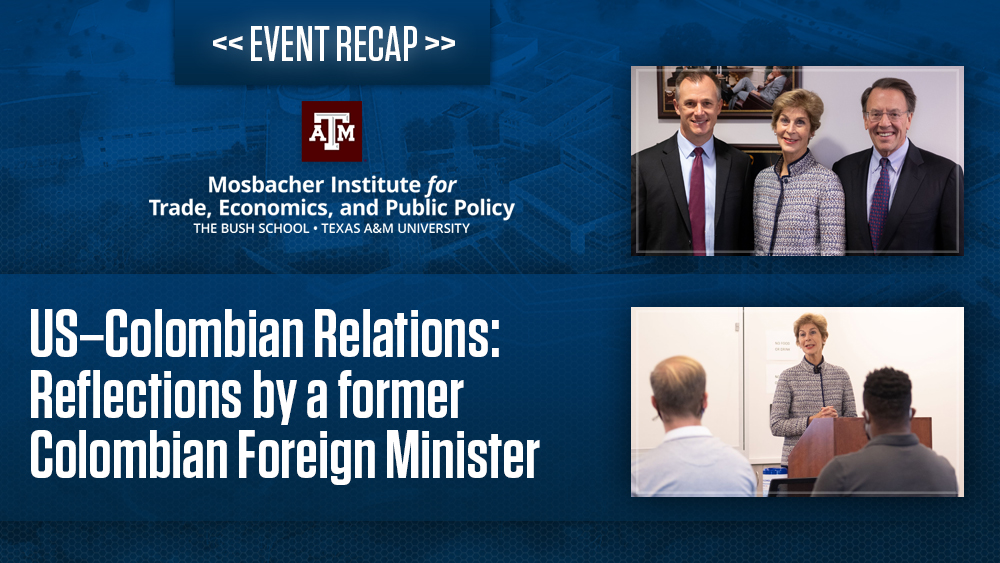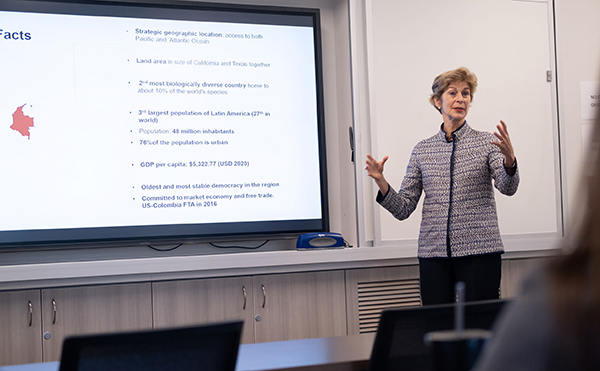
On October 28, 2021, Ambassador Carolina Barco, former Colombian Minister of Foreign Affairs and Ambassador to the US, spoke to a group of Bush School students and faculty about Plan Colombia, the joint US-Colombian initiative to address violence and insecurity in the region, and ongoing US-Colombian relations.
Ambassador Barco began her presentation by highlighting the strong relationship between the United States and Colombia, which has lasted for more than 200 years. The United States, Barco explained, inspired the Colombian independence efforts and constitution. Moreover, the two countries worked together to defend democracy across the globe. Colombia was the only Latin American country to join the US in its war in Korea. Colombia also played a role in resolving the Cuban Missile Crisis.
According to Barco, US-Colombian relations were particularly strong under President George H. W. Bush, whose presidency coincided with the presidency of Barco’s father, President Virgilio Barco Vargas. Ambassador Barco explained that both presidents understood the threat drug traffickers posed in both the producing and consuming countries and fostered cooperation between the two countries on the war on drugs.
Barco then discussed the context in which Plan Colombia was conceived. Colombia’s unique geography has made it difficult to connect the country through roads. This limited connectivity and limited state resources hindered the state’s ability to exert control in all parts of the country, which drug traffickers took advantage of to enhance their activities. Drug trafficking provided guerilla militants in the Revolutionary Armed Forces of Columbia (FARC) with the needed resources to recruit more people and have more access to advanced weapons and technologies, far exceeding the government’s capabilities. Plan Colombia was thus essential as it provided the Colombian military with intelligence and mobility capabilities, including helicopters, thus reinforcing national Colombian efforts to strengthen the military.

Barco stressed the bipartisan aspect of Plan Colombia. As Ambassador to the US, she had around 1,600 meetings with Congress members, both Democrats and Republicans. It was important, she emphasized, to maintain constant communication to update them on the plan’s progress and address any concern they had. Moreover, as Ambassador, Barco organized a trip for ninety-one Congress members to visit Colombia, see the situation firsthand, and talk to former FARC members so that they could develop a better understanding of the situation. Because of the mutual cooperation between the two countries, Plan Colombia, which started with $1 billion in US aid to Colombia in 2000, continues today.
Plan Colombia has adapted to the changing conditions in the country. Its scope expanded from only fighting drug production to fighting narco-guerrillas. The plan also included attempts to strengthen Colombia’s institutions, particularly its justice system. Similarly, it included economic development programs, including crop substitution programs.
As Barco illustrated, Plan Colombia has been a major success. FARC-controlled areas were radically reduced between 2002 and 2013. By then, FARC’s senior leaders with ideological loyalty towards communism were either killed off, arrested, or no longer in leadership positions. Only then was it possible for the Colombian government to negotiate with the new generation of FARC leaders. In the meantime, Colombia managed to increase security, reduce homicide rates, improve growth rates, radically reduce poverty and extreme poverty, and foster the growth of its middle class. This progress was complemented with the signing of a peace agreement with FARC, which was approved by Parliament in 2017. Plan Colombia was then renamed Peace Colombia.
Barco concluded her presentation by reiterating the lessons learned from Plan Colombia, particularly the importance of communication and bipartisan cooperation. She also discussed challenges that the government is still facing in regaining control of former FARC-controlled areas and efforts to prevent illegal activities from re-emerging.
While visiting the Bush School, Barco also spoke to Dr. Leslie Ruyle’s Women and Development class about environmental issues and Dr. Aileen Teague’s American Foreign Policy class about US foreign policy post-World War II.

